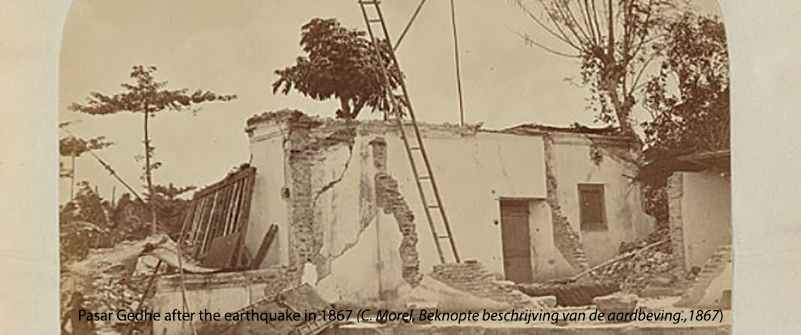
08 Feb Blog: Are you being committeed?
Earthquakes resulting from the extraction of natural gas for decades on end are now taking a heavy toll on the people of Groningen in the north of Holland. Typically, according to Willem van der Molen, the Dutch government reacts to the demand for safety and financial compensation by installing committees and collecting information.
Installing committees in order ‘to collect information’ as a response to popular need has a long tradition in Dutch history, as is illustrated by this example from colonial times. Almost 150 years ago, on Monday June 10th 1867, early in the morning Central Java was hit by a severe earthquake. Yogyakarta was ravaged, Kota Gedhe was completely annihilated. In addition to devastating these cities, the earthquake created hundreds of victims, especially among the Indonesian population. The Dutch-language colonial newspapers praised the Resident of Yogyakarta for his prompt help; and the government in Batavia was also commended for its quick offer of financial aid. However, these laudatory reports evoked critical reactions from some readers. Identifying themselves as ‘local witnesses’ they questioned the swiftness and adequacy of governmental help.
One such local witness left a Javanese account of the disaster and its aftermath. This was a Chinese businessman in Yogyakarta by the name of Ko Ho Sing. After having recovered from his shock, and after having checked on family and friends this witness started organizing help on his own initiative and at his own costs, providing food, shelter, bandage, graveclothes, materials and workers for to rebuild houses as well as other forms of aid. On the second day, so he writes, an official committee made its appearance, consisting of several gentlemen, who inspected the material damage and decided who was going to be compensated and who was not. (Incidentally, Ko Ho Sing was not.) Meanwhile, our source, Ko Ho Sing’s biography, is silent about possible praiseworthy acts of the Resident.
A linguistic note. Like every language, Javanese has all sorts of words for ‘to inspect’: standard words, informal words, bookish words, and the like. One of these words is ngumisi. Its etymology is easy to guess. It originates from kumisi, from the Dutch commissie. Nowadays it just means ‘to inspect’ but its original meaning was ‘to install or to send a committee for inspection’. In Ko Ho Sing’s biography it is used in connection with the above-mentioned committee. Dryly, Ko Ho Sing reports going back to work sawusira den kumisi, ‘after having been committeed’.
Did the people of Groningen already coin an expression for governmental attention in times of emergency?
(Willem van der Molen is a senior researcher at KITLV and professor of philology and Old Javanese at Universitas Indonesia in Depok, Indonesia. Within the field of his interest, the languages and literatures of Indonesia, his focus is on the history of Javanese literature).




gijs L. Koster
Posted at 10:28h, 09 FebruaryTwee werelden langs elkaar heen Yogya en Batavia, Groningen en Den Haag, Bedankt voor het kleine pareltje inzicht, Willem, groeten GIJS
Patricia Tjiook-Liem
Posted at 13:09h, 10 FebruaryDat het Nederlandse woord commissie reeds in 1867 is ‘opgenomen’ in de Javaanse taal, is wel een heel bijzonder detail. Mogelijk zijn er nog meer overeenkomsten of verbanden tussen het verleden en nu in Ko Ho Sings’ biografie. Het maakt mij nieuwsgierig.
Salam hangat,
Patricia